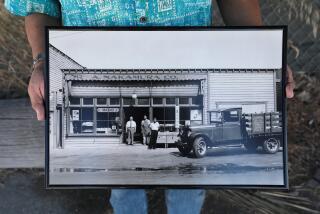Family Is Used to Working With a Net : 3 Generations of Tuna Fishermen Saw It All Change
- Share via
In the early 1900s, Julius Zolezzi and his wife, Victoria, moved to San Diego from San Francisco, bought the Pacaritto and began fishing for halibut and rock cod with his son, John.
But in 1932, when Zolezzi saw that more money was to be made in the tuna industry, he bought the Balboa, a seiner. The Point Loma family has been fishing for tuna ever since.
Three generations and eight boats later, Zolezzi’s great-grandson, John Zolezzi III, is carrying on the tradition. The 33-year-old skipper and his crew are scheduled to leave today aboard the Mary Antoinette on an expedition that will last anywhere from five weeks to three months in international waters off Mexico. Then he’ll be back with his family for two or three weeks before returning to sea.
‘Not Like It Used to Be’
Much has changed since his father, John Zolezzi Jr., 56, retired in 1974 and turned the seiner over to his son.
Tuna fishing “is not a family operation like it used to be,” said John Jr. “We are one of the few family-operated and -owned tuna boats.”
John Sr., 79, agreed. Families “are selling out to big corporations and foreign companies,” he said.
“There are people in the business that don’t know anything about the business,” complained John Jr.
He said it is the corporate-run fishing boats whose captains take shortcuts and make trouble for other fishermen. He cited incidents in which porpoises, which are often found near tuna, were killed after becoming tangled in the nets. The seiners are now required to have an observer from the National Marine Fisheries Service aboard while fishing, in order to protect the mammals, but even before that rule, “we tried saving the porpoises all the time,” he said.
“Without the porpoise, you can’t find the fish. If you do this long-term, you do what’s proper.”
$340 to $1,000 a Ton
The changing industry has also changed the face of San Diego. Only a few years ago, the city’s harbor bustled with tuna seiners that came to unload their gorged bellies at half a dozen canneries. Since the last cannery closed in 1984, the Zolezzi family has gone to the only remaining one nearby, the Pan Pacific Cannery at Terminal Island near Los Angeles. There, depending on the size of the tuna, the Zolezzis are paid anywhere from $340 to $1,000 a ton.
In recent years, the family has made a determined effort to avoid the shores of other countries. In 1979, John Jr.’s brother, Julius, owned one of the eight seiners that was seized near the Peruvian border because it was fishing too close to the coast. The family now stays 12 to 20 miles offshore. (Julius now operates three seiners in the East Pacific, and is director of the American Tuna Boat Assn.)
Despite these changes, the big advantage of being a family-run business has remained: The Zolezzis are able to set their own schedules. As much as they can, they try to stay home for the holidays.
“A corporation will send you out, Christmas or no Christmas. That’s the difference between being a corporation and a family,” John Jr. said.
Still, he acknowledges that he is happier now that his son has taken over and is thankful for the time he can spend with his grandchildren. “My kids grew up and I didn’t even know it,” he said.
John III agreed that being separated from wife, Machelle, daughter, Chalise, and son, John IV, isn’t easy.
“For the first week, you don’t even think that you’re on the boat. Then you realize that it’s your business; it’s your life. You accept it.”
Will 7-year-old John IV be the next Zolezzi to fill the shoes of the fisherman? His father doubts it.
“I’m pretty sure he’ll go to college,” John III said. “He loves the boat and loves to fish, but I hope he does whatever makes him happy.”
More to Read
Sign up for Essential California
The most important California stories and recommendations in your inbox every morning.
You may occasionally receive promotional content from the Los Angeles Times.










